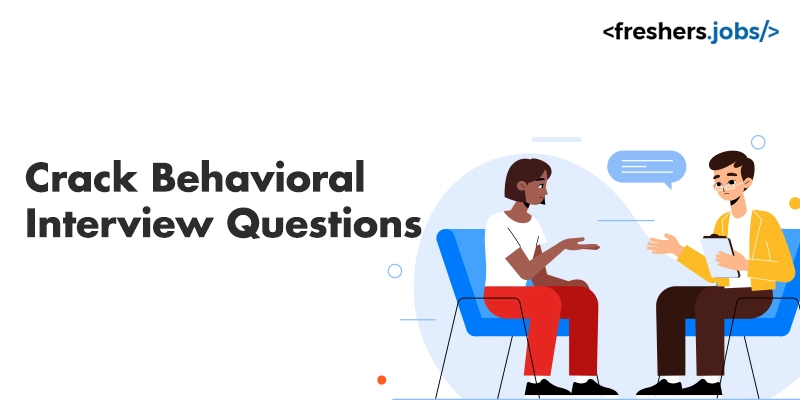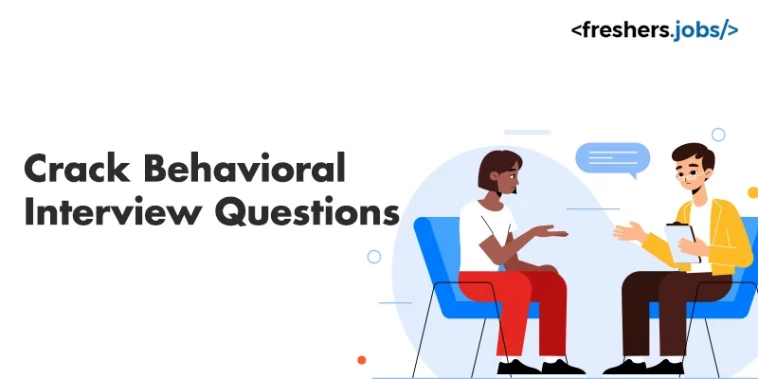If you are an experienced professional looking for a career change or upgrade, you must concentrate on answering behavioral interview questions in the HR round. This blog explains what such questions are and guides you with essential tips to answer these questions to secure your target job.

Behavioral Interview Questions
These are a type of interview question that are aimed at the candidates to describe how they have handled certain specific situations in the past jobs. The idea behind these questions is to predict the future performance of the candidate based on their past behaviour in any specific situation.
Key Characteristics of Behavioral Interview Questions:
- Focus on Past Experiences: They ask you to recall specific instances from your work history, projects, or even academic experiences.
- “Tell me About a Time” or “Give me an Example”: These are common phrases used to start behavioral questions.
- Target Specific Skills and Competencies: Interviewers use these questions to evaluate certain skills like problem-solving, teamwork, leadership, communication, and adaptability, which are crucial for the job.
- Require Detailed Answers: A simple “yes” or “no” to the questions is not enough. You need to provide context, explain your actions, and discuss the outcome.
Why are Behavioral Questions Used?
- Predict Future Performance: Employers strongly believe that how you have acted in the past is the best indicator of how you are going to behave in similar situations at their company in the future. Latest Job Alerts on several IT and non-IT jobs are posted in online job portals.
- Assess Skills in Action: The employees want more than just yes or no answers. Instead of just asking if you have a particular skill, the interview panel would want to see how you’ve actually used it and benefited the company.
- Get Concrete Examples: Behavioral questions help interviewers avoid hypothetical answers from the candidates and get real-world examples of your capabilities.
- Understand Your Thought Process: Your answers to such questions reveal how you approach problems, make decisions, and interact with others. This explains your problem-solving skills to the employers during practical situations.
Common Behavioral Interview Questions – Categories
- Teamwork and Collaboration: In this type, the employers ask questions about how you were working with others, handled conflicts, contributed to team goals and finally, how you achieved success.
- Problem-Solving and Decision-Making: These questions test you intending to know how you’ve tackled challenges, analyzed situations, and made tough choices. Whether your decisions are fruitful or not, it is important that you arrive at some decision in time. Your decision-making skills are checked through these types of questions.
- Leadership and Initiative: If you have donned any leadership role, the interviewers will ask you questions about your leadership qualities including taking charge, motivating others, and going above and beyond.
- Communication and Interpersonal Skills: These questions are about how you’ve communicated effectively, built relationships, and persuaded others within your team and in the office in general. These are the most common behavioral interview questions asked during interviews.
- Adaptability and Resilience: Sometimes, based on your experiences, the interviewers might be interested to know how you dealt with significant changes in the company’s work culture, project requirements, etc., and how you managed to handle job pressure. The questions will also target your learnings from setbacks in the past.
- Time Management and Organization: Interviewers ask questions to check your time management and how you organise and prioritise your work. You can expect questions about prioritizing tasks, meeting deadlines, and managing multiple responsibilities.
- Dealing with Failure: These type of questions will bring out the mistakes you made in your past career and the lessons you learnt out of them. You can provide honest answers and could create a positive impact on you during the interview.
Behavioral Interview Questions And Answers
- Tell me about a time you had to work with someone who was difficult to get along with. How did you handle it?
Example Answer:
Situation: In a school project, one teammate, Mark, kept missing deadlines and wasn’t doing his share. This made our group worried about our grade.
Task: As the leader, I needed to get Mark to participate and help us finish the project well and on time.
Action: I talked to Mark alone to find out what was going on. He said he was having trouble managing his time because of other things. Instead of getting mad, I offered to help him break down his work into smaller pieces and suggested we check in with each other regularly. I also made sure to tell him when he did a good job.
Result: By being understanding and helpful, Mark started participating more. He met deadlines, and his work got better. We finished the project successfully and got a good grade. I learned that it’s important to understand why someone is struggling and try to find solutions together to work better as a team.
- Describe a time when you faced a significant problem at work. How did you approach it, and what was the outcome?
Example Answer:
Situation: At my old job in customer service, lots of people complained about a bad product. We got swamped, and customers were unhappy.
Task: I needed to help handle all the complaints and fix the problem for customers and the company.
Action: Right away, I started organizing the complaints by what was wrong and how serious it was. Then, I talked to the people who made the product to figure out what went wrong. I also called customers to say sorry and tell them what we were doing to fix it, like giving refunds. I also suggested a way to keep track of all the complaints so we didn’t miss anyone.
Result: Because I organized things and talked to people, we fixed most of the complaints in a week. Customers started being happy again. My boss noticed what I did and said I was good at solving problems.
- Tell me about a time when you took the initiative to go above and beyond what was expected of you.
Example Answer:
Situation: During my internship at a non-profit, I saw they weren’t using social media much, and it wasn’t reaching many people. It wasn’t my job, but I noticed it.
Task: I wanted to help them get more attention online because it would help their cause.
Action: I looked up how non-profits can use social media well. Then, I made a simple plan with ideas for posts and how to schedule them. I showed it to my boss, and they liked it. So, I started making posts and managing their social media.
Result: After a few months, way more people were seeing their posts. They got twice as many followers and more people were asking about their programs online. My boss was really happy, and it made me feel good about taking charge and making a difference.
- Describe a time when you had to persuade someone to see things your way.
Example Answer:
Situation: Our marketing team was brainstorming for a new campaign. I had a different idea than usual, and some people weren’t sure about it.
Task: I needed to explain why my idea was good and get the team to try it.
Action: I put together a simple presentation showing my idea, backed up with some research. I also listened to their worries and made my idea even better based on their feedback.
Result: The team agreed to try my idea. The campaign did really well, getting more attention than we expected. I learned that it’s important to explain things clearly and listen to others when you’re trying to convince them. Freshers Jobs notifies you the availability of various jobs through job portals.
- Tell me about a time you failed at something. What did you learn from that experience?
Example Answer:
Situation: Early in my career, I led a small project with a tight deadline. I thought I could do most of it myself.
Task: I needed to finish the project on time and within budget.
Action: Because I didn’t plan well and didn’t ask for help, I got overwhelmed and missed deadlines. The project wasn’t finished on time.
Result: I learned that it’s important to plan realistically, ask others for help, and break big projects into smaller pieces. I’ve gotten much better at managing projects since then. I now know that mistakes help you learn.
To conclude, the Behavioral Based Interview Questions asked in your personal interviews will test your confidence and your experience in different work situations in your previous jobs. By taking the above clues, shape your answers accordingly and ace the interviews.



